- Latest articles

As the coronavirus convulses a planet without immunity, people are locked down, dreams are shattered, plans and projects are exhausted, markets and social lives are disrupted, public worship and community gatherings are restricted, and everything has become miserable. However, this viral villain, sowing seeds of death, gives you an opportunity to reflect on the vulnerability of your very being and your need to turn towards the Lord to build up solidarity between all of us. It is time to reset your goals to live a better life in the expectation of a glorious future. If you are prudent, you will confront yourself to put all your trust in the Lord and reflect on your limitations.
The disciples were traumatized by the arrest and crucifixion of their master. They were startled and bewildered by His appearances after the Resurrection and his command to prepare for the coming of the Holy Spirit. In lockdown, to protect them from arrest, they prayed for the power to face the challenge Christ had given them – to go and make disciples of all nations. The frightened apostles were transformed into fiery preachers and evangelizers when they were anointed by the power of the Holy Spirit. In this time of distress and difficulty, ask the Holy Spirit to transform you. With the power of the Holy Spirit, you can also change the face of the earth by going out to make disciples of all nations, starting right now with yourself and the people in your home.
When Alfred Nobel invented a powerful but stable explosive, he asked a friend to help him name it. This Greek scholar directed him to this Bible passage. “You shall receive power when the Holy Spirit has come upon you; and you shall be my witnesses in Jerusalem, and in all Judea and Samaria and to the ends of the earth.” (Acts 1: 8) The Greek word for power is dunamis, so he named it dynamite.
You could say: “I shall receive explosive power, like dynamite when, the Holy Spirit comes upon me.” When you feel empty and sad, pray to the Holy Spirit. The Holy Spirit, whom you received at your Baptism and Confirmation, is like a sleeping giant within you. In the Old Testament, only a few people were chosen to receive the gift of the Holy Spirit. But the prophet Joel received this message from the Lord: “Afterwards, I will pour out my Spirit on all flesh; your sons and your daughters shall prophesy” (Joel 2:28) predicting that the gift of the Holy Spirit would be available to everyone. Do not bury this valuable gift. Call upon the Holy Spirit daily.
The Holy Spirit is much more contagious than any virus in the created world. Humanity across the globe is locked down, but not without purpose. You need to permit the Holy Spirit to take control of your life. Let us be hopeful that He may actively re-create the world, so that He may prevail in our thoughts, imaginations and philosophies throughout our daily lives.
Prayer:
Breathe in me, O Holy Spirit,
that my thoughts may all be holy.
Act in me, O Holy Spirit,
that my work, may be holy too.
Draw my heart, O Holy Spirit,
that I may only love holy things.
Strengthen me, O Holy Spirit,
to defend all that is holy.
Guard me, O Holy Spirit,
that I may always be holy. Amen.
-Saint Augustine-
'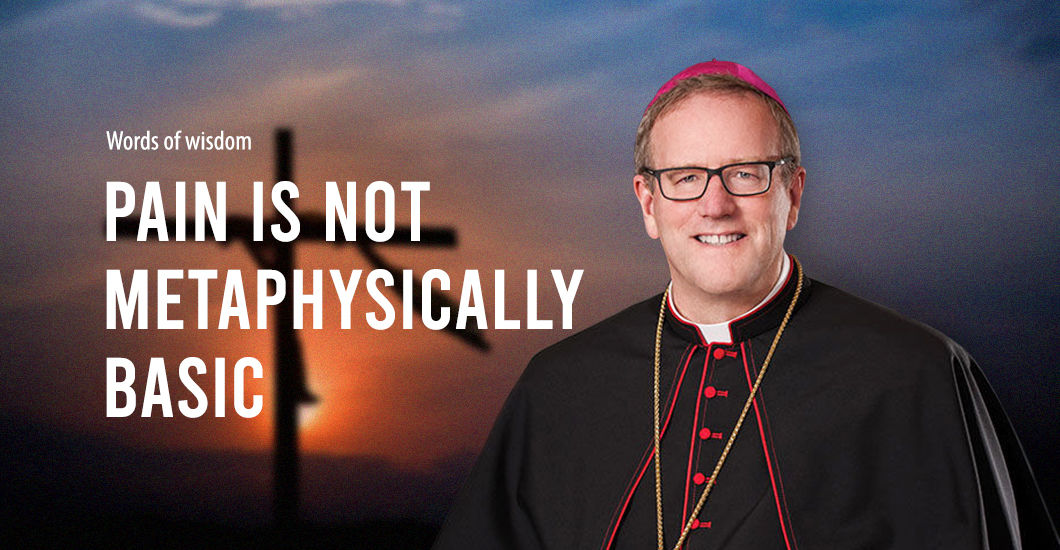
The long season of Lent has prepares us to delve once more into the mystery of the dying and rising of the Lord Jesus. As I have been contemplating the events of Holy Thursday, Good Friday, and Easter Sunday, my mind has turned, again and again, to the brute fact of pain. Perhaps this was conditioned by a recent conversation I had with Jordan Peterson, who commented that pain is somehow metaphysically basic. What he meant was that even the most skeptical philosopher would have to admit the existence of pain and would have to deal with it. Try as we might to flee from the world of matter, our bodies and our minds simply will not permit us to set aside the fact and the problem of suffering.
Everyone suffers and at a variety of levels. Babies suffer from hunger and thirst, and their piercing cries remind us of it. All of us have experienced at some point cuts, blisters, bruises, broken bones, infections, rashes, and bleeding. If we live long enough, we develop cancers; our arteries clog up and we suffer heart attacks and strokes. Many of us have spent substantial time in hospitals, where we languished in bed, unable to function. Innumerable people live their lives now in chronic pain, with no real hope of a cure. And as I compose these words, thousands of people around the world are dying, gasping for their last breaths.
But pain is by no means restricted to the physical dimension. In many ways, psychological suffering is more acute, more terrible, than bodily pain. Even little children experience isolation and the fear of abandonment. From the time we are small, we know what it is like to feel rejection and humiliation. A tremendous psychological suffering arises from loneliness, and I have experienced this a number of times in my life, particularly when I started at a new school in a city I did not know. Commencing one’s day and having no realistic prospect of human connection is just hellish. And practically everyone has had the dreadful experience of losing a loved one. When the realization sinks in that this person, who is so important to you, has simply disappeared from this world, you enter a realm of darkness unlike any other. And who can forget the dreadful texture of the feeling of being betrayed? When someone that you were convinced was a friend, utterly on your side, turns on you, you feel as though the foundation of your life has given way.
But we haven’t looked all the way to the bottom of the well of suffering, for there is also what I might call existential pain. This is the suffering that arises from the loss of meaning and purpose. Someone might be physically fine and even psychologically balanced but might at the same time be laboring under the weight of despair. Jean-Paul Sartre’s adage “la vie est absurd” (life is absurd) or Friedrich Nietzsche’s “God is dead” expresses this state of mind. Having surveyed these various levels of pain, we sense the deep truth in the Buddhist conviction that “all life is suffering.”
Now I want to take one more important step. There is a very tight connection between pain and sin. Most of the harm that we intentionally do to other people is prompted by suffering. In order to avoid it, avenge it, or preempt it, we will inflict it upon others. And this is the leitmotif of much of the dark and roiled story of humankind. To bring it down to earth, just consider how you behave toward others when you are in great pain.
My gentle reader is probably wondering by now why I have been dwelling so insistently on these dark truths. The reason is simple. During the holiest time of the year, the Church places before us an image of a man experiencing practically every kind of pain. The Roman cross was perhaps the most wickedly clever instrument of torture ever devised. The person whose infinitely bad fortune it was to hang from it died very slowly of asphyxiation and exsanguinations, even as he writhed in literally excruciating (ex cruce, from the cross) pain. That’s how Jesus died: at the limit of physical suffering, covered in bruises and lacerations. But more than this, he died in equally excruciating psychological distress. His closest friends had abandoned, betrayed, or denied him; passersby were laughing at him and spitting on him; the authorities, both religious and political, were mocking and taunting him. And dare I say, he was also in the grip of something like existential suffering. The awful cry, “God, my God, why have you abandoned me?” could only have come from a sense of distance from the source of meaning.
However, the one who hung upon that terrible cross was not just a man; he was God as well. And this truth is the hinge upon which the Paschal Mystery turns. God has taken upon himself all of the pain that bedevils the human condition: physical, psychological, and spiritual. God goes into the darkest places that we inhabit. God experiences the brute metaphysical fact of suffering in all of its dimensions. And this means that pain does not have the final word! This means that pain has been enveloped in the divine mercy. And this implies, finally, that sin has been dealt with. Once we understand that God’s love is more powerful than suffering, we have lost, at least in principle, the motivation to sin.
These wonderful Easter days teach us that pain, in point of fact, is not metaphysically basic. The divine mercy is metaphysically basic. And in that is our salvation.
'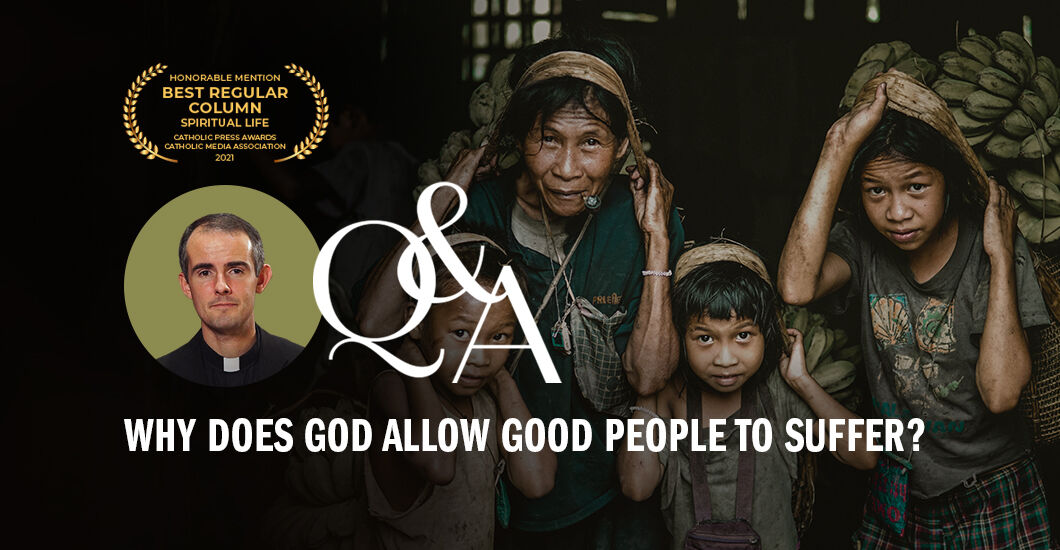
Question:
My best friend recently lost a terrible bout with cancer. It was heart-wrenching to watch her suffer for so long, only to pass away in the end. She was one of the most devout people I knew. Why does God allow good people to suffer?
Answer:
Thousands of years ago, a man named Job wrestled with that very same question. Why is it that good people suffer, while it seems like sinners prosper? At the end of the book of Job, God answers Job out of a whirlwind and says, in essence, “My ways are not your ways!”
But after Job came Jesus. And Jesus radically changed the nature of suffering.
Since Jesus was—God-in-the-flesh, He could have avoided all suffering. Being divine, He could have avoided all mental or physical pain from illness, injury, rejection, death of a friend, torture or death. But He chose to feel those things because He is Emmanuel—God- withus! Jesus knew that suffering was part of the human condition, so He chose to become “like us in all things but sin” (Hebrews 4:15).
Suffering was not part of God’s original plan. It entered the world because of original sin. When our first parents had turned away from the blessings that God had planned for them and sought to make themselves into gods instead, the result was death, trial, tribulation and pain. However, God did not make suffering as a punishment. No, it is a healing remedy, because suffering teaches us that love costs.
Consider this—when a mother stays up taking care of her sick child, it is arduous—but it is also an act of love. When a father works hard at a stressful and difficult job to put food on the table for his family, it is a onerous—but it is also an act of love. When a brother puts up with an annoying younger sister, it is challenging—but it is an act of love. We could not learn to love if it were not for suffering.
When your friend was going through cancer treatments, I’d imagine that many people helped her out in a variety of ways. They cooked for her, they drove her to appointments, they gave her encouragement, they prayed for her— and in all of these ways, the people around her learned how to love sacrificially, in imitation of Jesus.
When we are suffering, we can be conformed to Christ. Going through cancer teaches us the virtues of courage, perseverance, humility … and when we offer it up in union with Christ as a “living sacrifice” (Romans 12:1), we participate with Him in the salvation of the world! Every suffering we endure can help us grow in virtue. Remember—we are never closer to Jesus than when we are hanging upon the Cross with Him.
Ultimately, Jesus never promised happiness in this world. Rather, He promised the Cross. But, He also promised that He would never abandon us, and that all things work for good for those who love Him. From an eternal perspective, your friend’s suffering and death brought about her sanctification and innumerable graces were bestowed on her and many others—graces that we will only understand when we meet Christ in eternity!
'
How strong is your relationship with God, our heavenly Father? Your earthly father is deeply concerned about every trouble you face. Your heavenly Father has an even greater concern because He knows the troubles you reveal to no-one (even yourself sometimes).
Every first Friday of the month, Saint Francis of Assisi would spend time alone in the woods praying, from six o’clock in the evening until six o’clock in the morning. Observing this routine, one of his fellow brothers asked him, “How is it that you keep yourself awake to pray through the night?” Saint Francis replied “Go to the woods with an empty bag and another bag filled with stones. There, pray the ‘Our Father.’ Each time you repeat the prayer, transfer a stone into the empty bag. Do this throughout the night and as dawn approaches, all the stones will have been moved over to the empty bag and you will not feel sleepy!”
His fellow brother was very happy to hear this, so he followed Saint Francis’ advice. As dawn approached, he had transferred about three hundred stones into the empty bag. When morning finally came he was thrilled that he had prayed the whole night long without feeling sleepy or weary. He ran to find Saint Francis so he could report how many times he had repeated the Lord’s Prayer. However, when he discovered him, what he observed touched his heart. Kneeling beside the hedge, a tearful Saint Francis gazed toward heaven, clasping the first stone in his hand, still praying the first part of the “Our Father.” Awestruck, the Brother realized that Saint Francis’ relationship with God was very deep. He didn’t need to pray the Lord’s Prayer many times to keep alert. In his profound love for God, every word of the prayer was unfathomably fascinating.
At the sound of the ringing bell, Saint Francis set off for Mass without even completing the “Our Father.” This brought his fellow Brother to tears. Saint Francis hugged him, saying, “What we need in our prayer and in our Christian lives is an ardent love for our heavenly Father. If you have a loving relationship with your Father in heaven, everything else will fall in place.”
'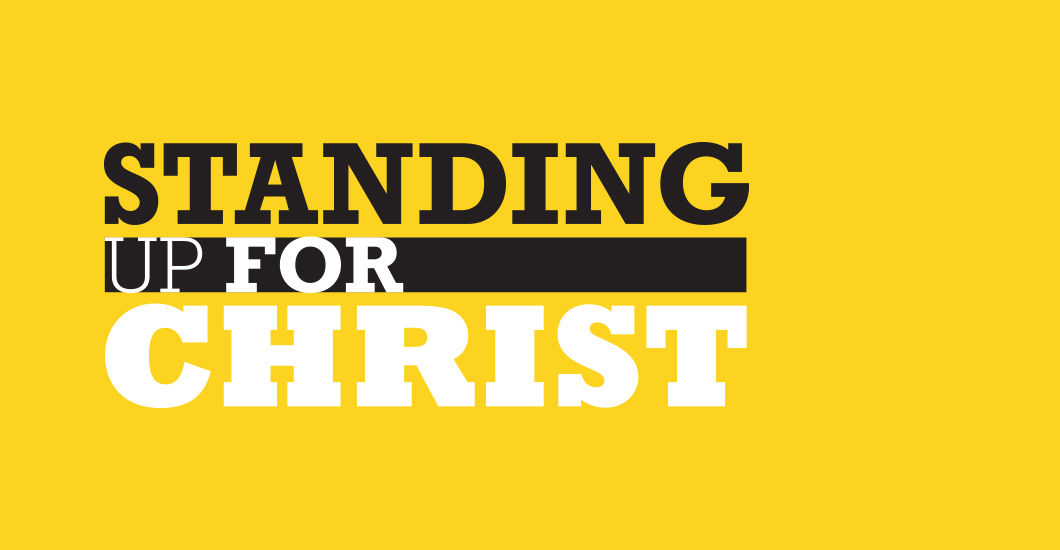
Esther Ahn Kim walked slowly up the hill to the shrine, with her students following silently behind her. The young music teacher knew that when she arrived at the place of worship she would be forced to make a life-changing choice. The Japanese, who had taken control of Korea in 1937, were forcing everyone to bow at the shrine of their “sun god.” The punishment for refusing was imprisonment, torture and possibly even death.
Even though so many other Christians had decided that outwardly bowing to the idol was acceptable as long as they continued to worship Christ in their hearts, Esther could not make such a compromise. She said a silent prayer to Him. “Today on the mountain, before the large crowd, I will proclaim that there is no other God but You,” she declared.
A huge crowd had gathered, standing in straight, respectful lines, afraid to move under the cruel gaze of the Japanese policemen. Esther’s heart began to pound with dread for what she was about to do. A sense of uneasiness swept over her, and she silently repeated the Lord’s Prayer, over and over. “Lord,” she prayed, “I am so weak! Please help me do this—watch over me as I stand for You.”
When one of the officials called out in a loud voice: “Our profoundest bow to Amaterasu Omikami!” the entire group bent down, bowing solemnly before the shrine. Esther was the only one who remained standing, looking up at the sky. The fear and uncertainty that had gripped her just moments before had vanished. Peace flooded her heart. She knew she had done what God wanted her to do.
Her courageous stand for Christ led to six harrowing years in Japanese prisons. During that time, though her body grew weak with suffering, she shone with a supernatural love for her persecutors and fellow prisoners.
One freezing night, Esther heard what she described as an “eerie, moaning sound.” She was informed by a jailer that it was a 20-year-old Chinese convict who was scheduled to be put to death for killing her husband. Unable to get the woman out of her mind, Esther asked that this dangerous prisoner could be brought to her cell. The jailer warned Esther, saying, “She’s crazy. She bites everybody.” Esther persisted.
The following days were arduous for Esther, physically, emotionally and spiritually. She gave up her meager prison food to this woman who was filthy and insane. Instead of despising her, like everyone else, Esther prayed for her relentlessly, sacrificing her own comforts to reach the woman’s heart. Over time, she was able to share Christ’s love with her new friend. Their fellow prisoners were astounded to witness the woman’s transformation.
When this young woman was taken to her execution, Esther’s eyes overflowed with tears, watching her walk “as though hurrying to meet Jesus Christ.” Because Esther decided to embrace this “crazy,” “dangerous” woman with a love she had never known, many others have since followed her astounding example of “suffering hardship as a good soldier for Christ.” By opening her arms to receive her, as she would receive Christ, she brought many others, who would never have heard the gospel otherwise, right into the Kingdom of God.
Am I prepared to suffer well for Jesus Christ? In the midst of our comfortable lifestyles, it’s easy to think, “Of course, if persecution came I would never deny the name of Christ. Of course, if I were thrown into prison I’d remain strong in my faith.”
We must ask ourselves, are we truly “dying to self” daily, as Esther did? Or are we more concerned with protecting our own comforts and interests?
'
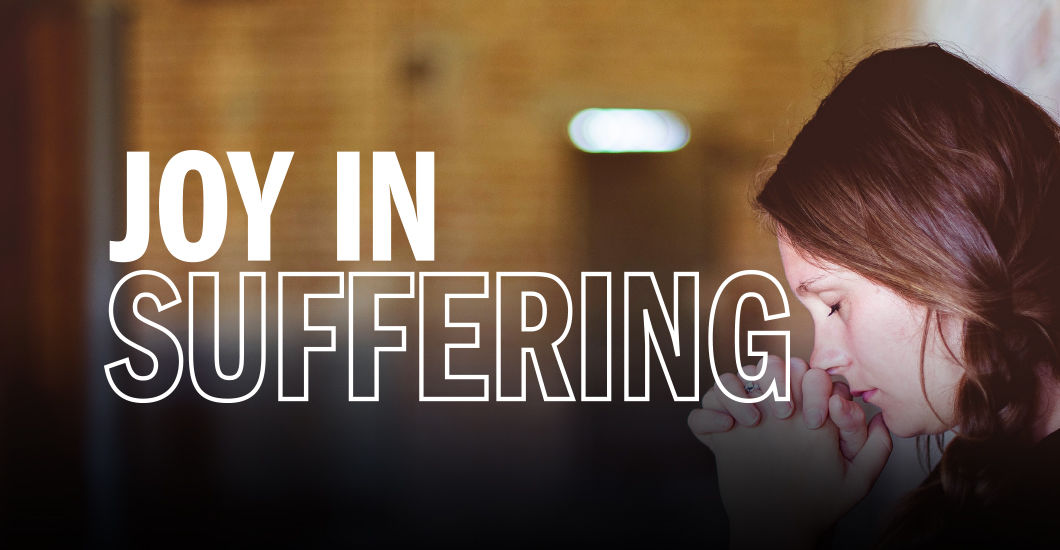
Better Not Be a Saint?!
Once I met a distressed mom who confessed her financial struggles, uncertainty about the future of her children and all the predicaments that troubled her. Hoping that the Word of God would not be lost on her, I said, “The Lord’s hand is not too short to save, nor His ear too dull to hear.” Encouraging her to surrender all her worries into God’s hand, I asked her to pray even more. I advised her that recognition of shortcomings paves the way for God to reach our hearts and be drawn closer to Him.
These words seemed to relieve her but after a while she asked a startling question: “I feel that when we are growing closer to God suffering also heaps up. To avoid all those hardships and sufferings, is not it better to not pray as much?” I was stumped. Is that true? I remembered all the saints and their holy lives. Many of them endured severe hardships. This reminded me of the amusing plight of a colleague who tried to inspire his children with stories of the great saints. Each night, beginning with the apostles, he narrated the history of their brave, heroic virtues with great enthusiasm. At the end of the week, his elder daughter blurted out, “Does becoming a saint involve lots of suffering and a painful death? Then I’d better not be one!”
Do or Die
Saint Peter, the rock on which the Church was built, received the crown of martyrdom when he was nailed to the cross with his head toward the ground and his feet raised high. Simon the Zealot is often depicted with a saw, because there is a tradition that he was martyred by being sawn in half. Most of the apostles were crucified, except for Saint John, who miraculously survived after being poisoned and plunged into boiling oil. Is there any saint who comes to mind, that did not suffer?
Do you still dare to have a life deeply rooted in faith? Does the fact that one must bear the cross frighten you from developing a deeper spiritual life? Take heart! For Jesus has already given you the answer.
A life without any crosses is much like a fairytale. When I dodge one, a heavier one may appear right in front of me. This is not reserved for the faithful alone. Everyone, regardless of class, creed or religion is confronted by this conundrum, even atheists and agnostics! Religious or not, people go through adversities in life. What is the difference when faithful people are afflicted?
When I meditate on Christ’s passion and death, my mind often drifts to the movie, “Passion of the Christ.” Here are some of the ways its scenes have profoundly touched my heart.
When You Embrace the Cross …
After confession, I often feel a sweet sensation. My heart soars as light as a feather and I almost float back to the pew to pray my penance and make my resolutions. Strangely, on one occasion I had the opposite experience. Instead of that light and pleasant sensation, I felt weighed down with heaviness and drained of energy. The mere thought of performing necessary, menial tasks overwhelmed me. Looking right at the tabernacle, I closed my eyes and surrendered everything to Jesus. Suddenly, I felt like blood was raining down and I was being washed completely in it. When I opened my eyes, I distinctly heard the words, “Take up your cross … follow Me.”
Jesus is inviting you and me to embrace the crosses in life for love of Him. In the “Passion of the Christ,” when Jesus is forced to carry the cross He first embraces and kisses it, in spite of the soldiers’ mockery. This reminds me to embrace the hardships in life with joy. In that moment, I was deeply strengthened to be joyful even when everything seems to be going wrong around me. When we truly accept the cross, nothing will be too heavy or difficult to face, for He will carry it with us.
Compelled to Carry the Cross
After the birth of my son, I had a grueling time feeding him. Every time I fed him it was so excruciatingly painful that I had to grip the arms of the chair. I wept but I still bore that torment to fill his little tummy. It was not easy. Just when I thought it was intolerable, the image of Jesus on the cross came to mind. I cried out to Him, begging Him to bear this agony with me. All my pain suddenly became bearable. I could still feel it but the grace of God helped me to endure it.
When Simon of Cyrene was called out of the crowd to carry the cross, he may have been resentful, even bitter at first, about the cross he was compelled to bear. He was simply a man on his way to something else when the soldiers pulled him out of obscurity and into the fifth station of the way of the cross. By the end of Simon’s brief journey with Christ, he was changed forever. In the movie, Jesus falls as they carry the cross along the road to Golgotha. Simon quickly picks him up, saying, “We’re almost there! It’s almost over!” It always crushes my heart to see Jesus looking back at him.
Simon felt compelled to remain with Christ, to finish it. Likewise, when we grumble about our suffering, do we really see Jesus holding onto us, taking the entire weight of our sins on His shoulder? In blood-soaked clothes, He treads the path and will accompany us, no matter how bad things may be. When Simon finished the journey to the summit of Calvary, he stood as a witness to the passion and death of Christ on the cross, which yielded the gift of eternal life.
A Drop of Tear from Heaven
At the climax of the “Passion of the Christ” we see a teardrop falling to the ground after the death of Jesus on the cross. Our Heavenly Father loves us so much that He gave His only beloved Son to redeem us from our sins. Sadly, many turn away from God in their sufferings, saying that God does not really love us or how could He send us such torments to bear. Little do we realize that most adversities are the aftermath of sins we have committed, or a means of purifying us from even the smallest trace of sin. Suffering, a consequence of original sin, acquires a new meaning when we offer it to our Heavenly Father. It becomes a participation in the saving work of Jesus (“Catechism of the Catholic Church,” 1521).
Let us not waste a single moment, but valiantly stand up for Christ. “It is no longer I who live but it is Christ who lives in me” (Galatians 2:20). Saint Padre Pio was once asked if one must ask for more sufferings to live a holy life. He simply replied that we just need to accept all that comes our way joyfully. Each day has its own crosses and delights. By accepting them gladly we are actually participating in the salvific plan of Jesus.
In the words of Saint Thérèse, if we can pick up a pin from the floor for love of God it can surely save a soul. Offer up all your pain and sorrows for those who do not know Jesus or have gone astray. Remember, you cannot avoid the cross but, by embracing it together with Christ, you can turn your affliction into joy. Let us put our treasure in heaven!
'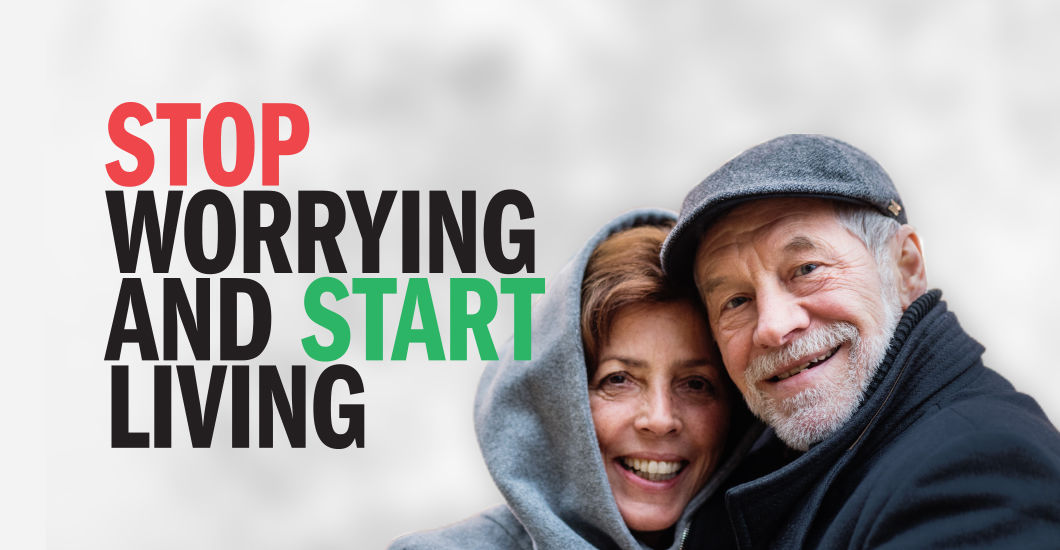
“I surrender …”
No military leader ever wants to say that phrase. It implies loss. Giving up. Bowing down to someone more powerful.
That phrase also frightens many Christians. It means they have to follow God’s will. It means God is in charge and we, as fallen creatures, do not like to hand over control to God. I wanted to surrender my life to God’s control but excessive fear and pride held me back.
In the summer of 2018, I finally discovered the key to yielding to God’s will. My surrender to God was kickstarted by my wife’s diagnosis with a terminal illness called Huntington’s disease, a rare neurodegenerative disease with no cure. If you are related to someone who has it—my wife’s father died from it, as did multiple relatives on his side of the family—you have a 50 percent chance of getting it. Here is a common description of the illness: imagine that you have Alzheimer’s, Parkinson’s and ALS (Lou Gehrig’s disease) rolled into one disease. A genetic test last summer revealed she had it. Our 22-year-old daughter also tested positive for the gene last spring.
This news was devastating. Falling onto my knees in fervent prayer, I cast my problems at the feet of Jesus. I realized I needed to turn to Him for the answer. His life and mindset modeled surrender. Only He could give me the love and peace I needed to accept God’s will, and only He could fill me with the kind of patience and love I would need as a caregiver.
Banishing the “If Only”
In the months since, I have learned that surrendering to God’s will requires living in and acknowledging the sacrament of the present moment, a phrase most famously used in the 17th century by Father Jean-Pierre de Caussade, S.J., in his classic book, “Abandonment to Divine Providence.”
This phrase means we need to lovingly accept whatever God is allowing, in His divine will, at each moment of the day. My path to holiness depends on seeing God in each moment, being wholly indifferent to what I may perceive as “bad” things in life, such as something not going my way or a suffering I wish I did not have to endure.
In this spirituality, we live each moment confidently as a blessing from God, full of faith and gratitude for His love and mercy—not anxious about the future, or bogged down by the past, but surrendering each moment with love to the one who is love.
To show you the power of this surrender, here is a concrete example. This past November, my sister, Rose, died in a tragic accident. During a bad storm, a tree fell on her car in her driveway as she and her son waited for the tempest to pass. They had just returned, full of joy, from a faith-related event that evening. Her son lived, but her spinal cord was fatally severed.
A week later, on the night before her funeral, my nephew (her son), a friend of my late sister and I attended a talk on surrendering to God by Father Jeffrey Kirby. He had written a book, “Be Not Troubled,” based on Father de Caussade’s book.
Bouncing Off the Fear
That evening, I drove to the airport to pick up three of my sister’s friends who were arriving to attend the funeral. I was in an old Crown Victoria, a car much larger and older than my car back home. I was not used to the brakes. You had to really push down to get decent braking action.
The roads were slick, the night was cold and I was unfamiliar with the route. All these factors combined to make me anxious. I stayed anxious for about three minutes. Then I remembered Father Kirby’s talk and his book, which I had just read that week. I also thought about how, in recent months, I had been training myself to be in the present moment. To accept God’s will, I repeated “Jesus, I trust in You” over and over.
My anxiety disappeared. I was in the moment and God was with me, so all was good. As I was returning with Rose’s friends, a deer crossed two lanes of the highway, on a collision course with my car. I swerved slightly to the right as I braked, but the deer bounded into the side of the car, shearing off the left rearview mirror. It happened in an instant.
My reaction: I was as calm as I had been before the deer appeared. My sister’s friends were astounded. I was in the present moment. God was there. Thanks be to God.
In his book, Father Kirby wrote: “Holiness is found here and now. Holiness is looking for God’s presence where we are, and not where we would prefer to be. It is seeing God’s goodness in circumstances or people we would rather not. Holiness is leaving the world of fantasy and wishful thinking and being in the present moment. It is being attentive to where we are and what we are doing—not existing in the future, but accepting God’s providence that is at our fingertips.”
I am surrendering. Will you?
'
Facing a Dilemma
Many couples today are perplexed by a fundamental question. Is it essential to introduce faith in Jesus Christ to my little child? More precisely, is transferring faith necessary? The influx of secularism creates a further dilemma. Should we bring up our children in our own faith? Why not leave it to the children to choose their own faith and way of life? Before we consider the question more deeply, wisdom directs us to look to the natural world.
A crow protects its nest and feeds its chick until it can fend for itself. A calf suckles from its mother until it can survive entirely on grass. Not only do crows and cows teach their young how to feed, but they also introduce their little ones to social norms.
So what makes humans different? Has God not given us the ability to think and exercise free will? Then how could anyone leave their young children drifting without physical or moral direction? If animals and birds teach their young to follow their ways so they can avoid danger and receive nourishment, humans—created in the image and likeness of God—have an even greater responsibility to nurture our children to do the same. This is critical, not just for their lives on Earth but for their eternal destiny. Christian parents are called to help develop their children’s God-given gifts so that they can reach their fullest potential and serve God and neighbor.
Responsible Parenting
The Church is unequivocal in its teachings, reminding us that “Parents have the first responsibility for the education of their children. They bear witness to this responsibility first by creating a home where tenderness, forgiveness, respect, fidelity and benevolent service are the rule. The home is well suited for education in the virtues” [“Catechism of the Catholic Church” (“CCC”), 2223]. Moreover, parents have a moral responsibility to give good example to their children. By their example, children should see and learn how to subordinate material and impulsive desires to interior and spiritual ones. Further, “Through the grace of the sacrament of marriage, parents receive the responsibility and privilege of evangelizing their children. Parents should initiate their children at an early age into the mysteries of the faith, of which they are the first heralds for their children. They should associate them from their tenderest years with the life of the Church” (“CCC,” 2225).
Whose example can we follow? When we have the exemplary case of the Holy Family of Nazareth, should we look any further? In the Scripture, we see that the child Jesus “grew in wisdom and in stature and in favour with God and all the people” (Luke 2:52). Jesus learned from the daily witness of His Blessed Mother Mary and foster father, Saint Joseph. Their simple prayerful lives—carrying out religious duties like visiting the temple and memorization of scriptures—shaped His life.
Sowing the Seeds of Faith
From our own experience, praying grace together at meals was a simple way to plant the tiny seeds of faith. Calling on our guardian angels and Saint Michael the Archangel to guide and protect us on the way to school helped to foster trust and faith in our little ones. It is easy to practice such simple acts of faith, yet their fruits are abundant, just like the seeds that fell into the fertile soil (Matthew13:1-23).
What a child has not received from home is almost impossible to gather as richly from another source. Although others may complement what is lacking, the fullness of life comes from a proper orientation of faith within the family. A prayerful family environment teaches a child to trust, to hope, to feel secure, to give and to know where to seek support when needed. Even when they are just listening to the family pray in the church or at home, a child learns how to pray and recognizes that sense of unity in faith we share.
Modern psychology has thrown a lot of new light on how a person develops mentally. Most of this development occurs between conception and the age of six years. The thoughts and feelings experienced by a mother during her pregnancy affects the child’s development. A child who learns to pray within the family (the primary school of virtue) and is also raised in communion with the Church naturally grows up to have a sense of belonging, hope and trust. Therein lies the significance and necessity of family prayer. The pressures of modern life sometimes make it all too convenient to avoid gathering together for evening prayer. However, in a day there are plenty of opportunities for a family to pray and give thanks to our Creator. Prayer before meals is a good opportunity to teach our children the value of gratitude.
Just Passing on Faith is Enough?
It is therefore critical that faith transfer starts in the family. The Church, the school and the wider community add to the beliefs a child has gained from the family. Pope Saint John Paul II testified that the sight of his own father kneeling to pray the rosary in the middle of the night powerfully aroused his faith. He is a notable example of a saint in our own times, showing us the strength and fruit of faith developed in the family. Is it enough to just pass on our Christian faith? Parents must continue to pray for their children without fail, like Job of the Old Testament. Fearing that his children may have sinned after their days of celebration, he offered sacrifices for them. The prayers and offerings of Saint Monica of Hippo gave the Church Saint Augustine, a doctor and father in faith. The choice is ours. Do not be afraid. Keep the faith and share it with your children, so that you may all run the race to the end together and receive the crown reserved for the righteous.
'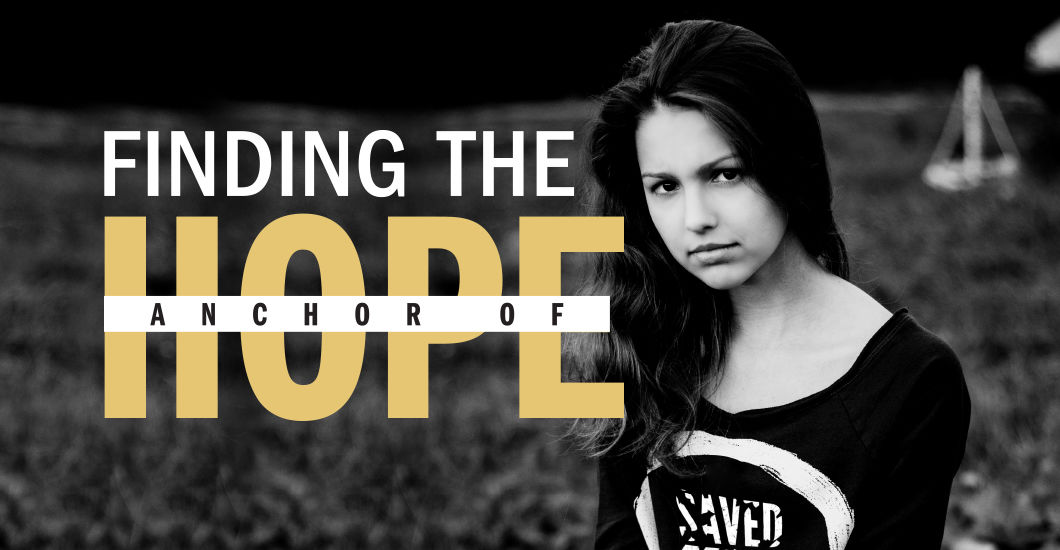
Have you found peace amidst the storms of life?
Here’s an anchor that will keep you from drifting!
Countless trials and misfortunes have beset me and I have experienced more suffering than I ever thought it possible to bear. It seemed that every time the darkness would begin to lift, another calamity would befall my family. These life-changing, heartbreaking and even financially devastating hardships seemed relentless. The stress, anxiety and fear I felt was overpowering, very nearly debilitating. At times, I felt I was losing hope and maybe even my mind.
Many mornings, I was so overcome with hopelessness that I longed to pull the blankets over my head and hide from it all. While at night, tears would sting my cheeks as I cried myself to sleep, ceaselessly praying for help and guidance.
Suffering Not in Vain
In these difficult times, I was comforted by Saint Ignatius Loyola: “If God sends you many sufferings, it is a sign that He has great plans for you and certainly wants to make you a saint.” These words never failed to remind me that earthly sorrows are not in vain.
In the midst of my afflictions, I found my strength and that was prayer—constant and confident prayer. My precious string of hope, my rosary, never left my hands. The faint bead imprints on my skin were a visible sign of my devotion to our heavenly mother. Saint Padre Pio once stated that holding the rosary was like holding our Blessed Mother’s hand—and I desperately clung to her tender hand daily, like a child, her devoted, trusting child.
A Treasure Trove
As the Little Flower of Lisieux would affectionately say, “Mary is more mother than queen.” Her motherly heart longs to draw us ever closer to our loving God and the reward that awaits us in the next life. Prayer, especially the holy rosary, never fails to bring comfort and hope when I am feeling lost or disheartened.
For me, the rosary is truly a treasure trove of graces, giving strength and hope. Our heavenly mother has an immeasurable love for us all, and what better way to cluster around her? This form of prayer is abundantly rich in blessings, guiding me through the darkest of days, when despair was slowly engulfing me. Meditating on the mysteries draws my heart to heaven and reassures me that I am never alone in my sorrows.
Praying for the strength to face my trials, while simultaneously offering them up to our heavenly Father, brings me joy in the midst of my distress. I seek to imitate dear Saint Teresa of Avila who humorously responded to her afflictions by telling Jesus, “If this is how You treat Your friends, no wonder You have so few!”
'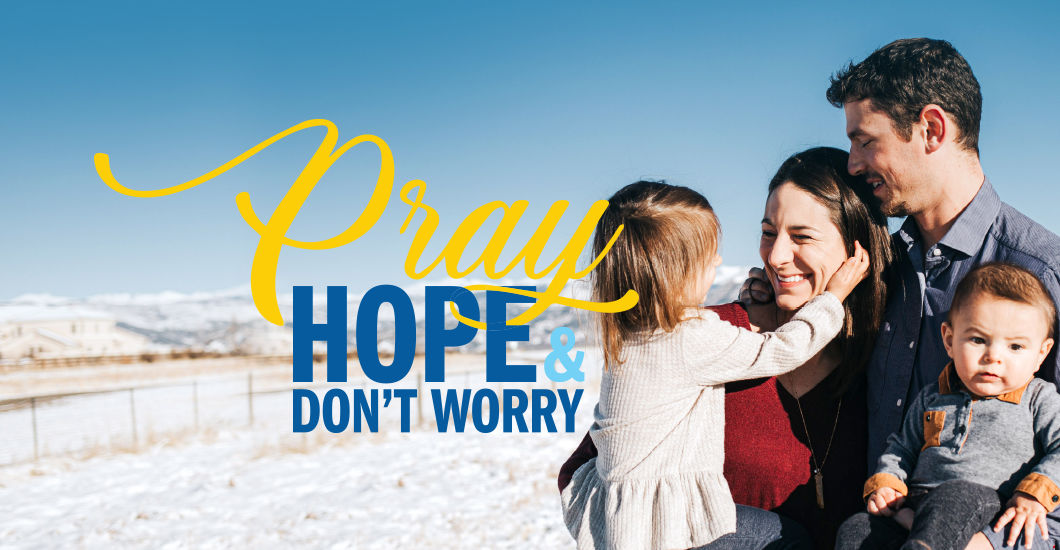
We go about our days, engaged in the home or workplace, distracted by good things that keep us from prayer. When we stop praying things begin to go wrong!
There is no doubt that the more we pray, the happier we become; in fact, the more we pray, the less anxious we become, and we are filled with a greater peace of mind and heart. The more we pray, the more we understand ourselves, for we come to know God more intimately by experience and we really only know ourselves to the degree that we know God personally. The more we pray the more we begin to see the hand of God in our day-to-day life; that is, we see Him acting in our life. We begin to see that He loves us, personally. That makes life so much more meaningful.
Cultivating a Prayer Habit
The most important thing is to acquire the habit of prayer. It has to become a habit. Without that, we do not have an interior life; we just have an exterior life. When all we have is an exterior life we become anxious, restless, and that leads to greed, the inordinate love of possessing. We end up trying to secure our own happiness and to reduce our own anxiety, and when things do not go our way in life we become angry, impatient, irritated, we lose the peace for which we long. When we are at that point, it means we have taken our life into our own hands. Life is not meant to be lived out of our own hands. We are meant to be carried along by God, like a baby is carried in a car seat. We are meant to be carried along by divine providence. God is in control, not us, and we have to surrender to His control. When we do so, life becomes so much more exhilarating.
If we do not pray we open ourselves up to deception. This is such an important point. Diabolical deception is so subtle, and we are just not intelligent enough to defend ourselves against the subtle deception of the evil one. An angel is inconceivably superior, intellectually, to human beings, and the person who does not have the habit of prayer is open to all sorts of deceptions. The goal of the devil in sowing lies and deception in the minds of human beings is to divide them, to create division and animosity. That leads to divorce, or broken friendships, mutual distrust, animosity in the family or in a religious community.
The only defense against that is fervent and persistent prayer, the lifting of the mind up into the presence of God. So much takes place during prayer. When we pray, we enter into the deepest region of the self where God alone dwells. No one is permitted to enter into that deepest region, only God dwells there, and there He awaits you and me, individually, and it is there that He speaks to us in silence. When we enter into that region life often becomes much richer, far less anxious and much more tolerable. What happens is that we are given a new pair of eyes to see the world. The world begins to look different. We begin to see the beauty of the world around us. We begin to see other people from God’s point of view, and when that happens they begin to look better. When we see ourselves from God’s point of view we begin to look better to ourselves and we feel better about ourselves.
What if I Don’t Pray at All?
If we do not acquire the habit of prayer, old age is going to be one difficult and painful ordeal. If a person has an interior life then life restricted to a hospital or an old-age home is not such a horrible prospect, because that person’s joy comes from communing with God in the very depths of his or her soul. Such souls are never alone because they know intimately the God who dwells deep within them. They sense the presence of God within themselves.
It is like being in the presence of someone you love. I recall visiting a parishioner in the hospital who had a stroke, and as I walked slowly into her room I saw her husband sitting there, just looking out into space. Then I saw her sitting there, looking out into space, saying nothing. They did not have to say anything, they just enjoyed being in one another’s company. They did not have to carry on a conversation.
When I was a teenager I sometimes picked up the phone and did not hear a dial tone, nor did I hear talking. I thought there was something wrong with the phone. I would listen, only to discover that it was my mother on the phone with her good friend. They were not talking, but they were in the presence of one another.
That is the point we have to get to with God. When we know His interior presence as a result of the habit of prayer, we are not lonely. We are alive; we are in joy, although on the outside it might look to others that we are bored or lonely.
Are You Living Death?
If we have never prayed, in our old age we will be simultaneously dead and alive. We will undergo a living death. Since we do not have an interior life, we have sought our peace from the outside. Old age renders us incapable of a good exterior life; we cannot travel or go hiking, we cannot go for a swim or a jog or do what we used to do when we were young. I know some seniors who because of their eyes cannot read anymore or watch movies, etc. Life becomes intolerable if we do not have an interior life. When we have a rich interior life as a result of years of prayer, all these other external activities are really quite dull and quickly “get old” next to the intense joys that come from contemplative prayer.
If you have not really begun to pray regularly and wish to know how to start, begin by setting aside a certain time every day and reading one psalm from the Old Testament; it will take five months to get through all 150 of them. Then offer a prayer of petition, and trust that God will necessarily grant you that prayer if it is for an increase in holiness. Then pray a prayer of intercession. God hears our prayers for others and He answers them, in His own way and in His own time, and so we should pray for others, persistently and in a spirit of trust, for our children, our relatives, our enemies, those we cannot stand, those we find difficult to forgive but whom we need to forgive. We should remember to pray for the sick, for the suffering and for the country as a whole, that as a culture we may return to God. Then offer a prayer of thanksgiving, and spend some time in silence.
Eventually we will acquire a profound sense of God in the interior of our souls. After years of that, we will be ready to leave this world and we will not fear death—we will look forward to the day when we will see God’s face directly. That is eternal life, and that is what this life is a preparation for. All this begins in the decision to pray regularly. Amen.
'
Unmindful Grumblings
Recently, I caught myself complaining about a matter so trivial that it would never affect my life. I had to remind myself to stop and keep the promise I made to Our Lady many years ago, amidst the deprivation and poverty of the refugee camps in Bosnia–Herzegovina.
Chastising myself, I apologized to God and set out to thank Him for every blessing. Later that evening at Mass, I prayed, “Lord, my complaints must hurt You when You have been filling my days with grace, blessings and gifts. I must seem so ungrateful to You.” Tears filled my eyes as I reflected on my selfish demands. When I contemplated the joy my loving Father’s abundant gifts had aroused, I felt guilty for grumbling.
I renewed my resolve to thank God throughout the day, in spite of petty irritations. How could I separate myself from disappointment when I did not get my own way or when God did not answer my prayers in the way I expected?
Count Those Blessings
God, our Father, encourages us to accept what we receive, rather than entertaining big expectations and indulging ourselves in discontent. Often, I have been more blessed when Our Father did not give me what I asked for, because it would have been detrimental to my life. Now, I am very grateful for the occasions when God gave me something better. Although I had to curb my impatience when I had to wait, invariably there was always a far better outcome when I let God work it out.
Gift of Tears
Sitting down before the Blessed Sacrament last week, I decided to make a mental list of all the extraordinary blessings God has given me since I began a pilgrim journey with Our Lord and Our Lady in the new millennium.
I began thanking God for giving me the courage to face my fears and accept responsibility for the consequences when I was at fault. When I recall the early days after my first trip to Medjugorje in 1998, I was filled with fear. When I had big decisions to make, I sat in adoration of Our Lord every day for months until I felt reassured that Jesus would look after me. When I faced those tough times, I knew it would never be easy but by frequently repeating, “Jesus, I trust in you,” I felt an extraordinary grace and calm envelope me that was not self-generated.
As I progressed spiritually, I contemplated the sorrows emanating from dark and deep places in the recesses of my mind—places I never wanted to go. I began a long and arduous journey of forgiveness toward my abuser, which culminated many years later in a prayer for his soul as I knelt beside his grave. The gift of tears resolved the trauma I had held inside me and gently opened up my respiratory system.
My childhood stammer began to dissipate. By 2005 it had been healed, and my life became free and enriched with confidence. For the first time, I was able to speak in public without experiencing high anxiety levels.
Miracles Happen!
Throughout all those years, I was sustained by grace to serve the poor and displaced in Bosnia–Herzegovina. In December of each year, displaced families moved into their new homes—our gift to them. As I watched the children growing in character, strength and confidence and the adults settling down to a dignified life once again, I saw miracles happen when people gave without counting the cost. I was in awe at the amazing things God did for His poor and forgotten. His generosity is matchless.
In the richness of God’s mercy, the gaping hole left in my heart because I could not have children was filled with the tender love from little hearts all over Bosnia–Herzegovina.
When I left behind the hurt, hatred, anger and disappointment, I encountered love everywhere. Because I walked with God I was no longer afraid to accept embraces and affection from the most vulnerable of the displaced people, particularly those who had mental health problems and physical deformities. As my trust in Jesus grew, I experienced Him in every situation. Sometimes my heart burned with love as I opened it to comfort and care for the broken, sick, maimed and dying.
Never Give Up Hope
My time in Bosnia–Herzegovina was the most enriching 15 years of my life. Our Lord, Jesus, and His Blessed Mother, Mary, had taught me about the primary importance of the salvation and conversion of souls and how to forgive, to love and to accept people for who they are. I pray for all God’s children regardless of their beliefs.
The steadfast faith amid the suffering of Catholics in Bosnia–Herzegovina inspired me to tell their stories in “Journey of Ten Thousand Smiles.” I did not know how to start but after three years of prayer God showed me how to relate the harrowing traumas they had experienced without being repulsive. He gave me the descriptive words and detailed memories to put their compelling stories onto paper. It still amazes me that “Journey of Ten Thousand Smiles” has gone around the world, bringing incredible peace and hope to many people who had been unable to accept God’s will in their lives.
Even in these hard times, when so many good values we have known in our lives are being challenged, shattered and discarded by many, we must never stop praying or give up hope. I look back and ponder on the miracle that the people of Bosnia–Herzegovina witnessed in their darkest days—then marvel at the Father who kept His promise to His children.
Let us move forward into a new year together in prayer, hope and faith with a mother we are blessed to call Our Lady and a Father who is infinitely full of mercy and love. He wants nothing more than salvation for all His children.
'